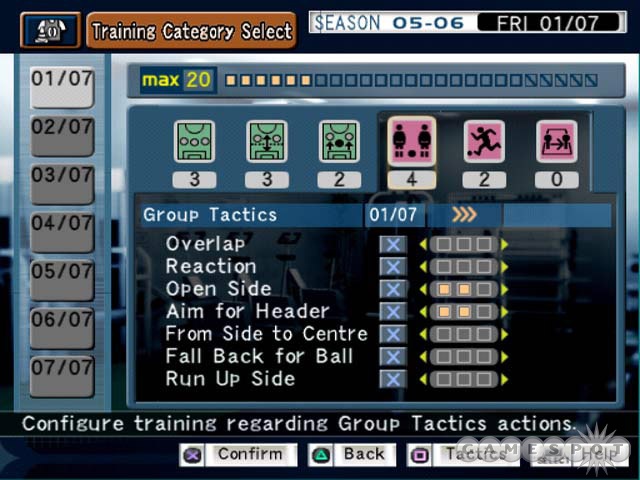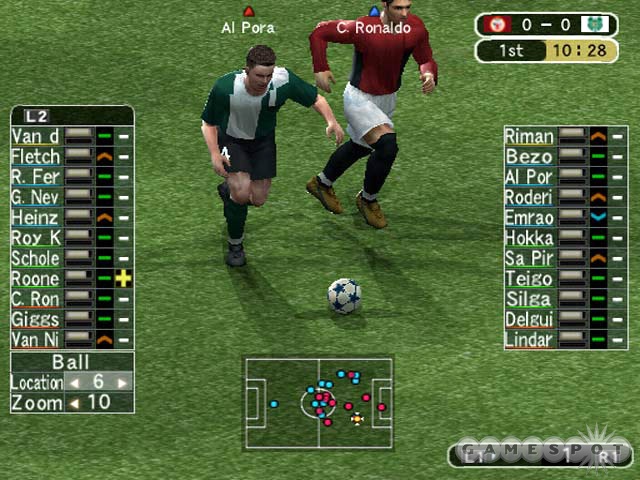Konami's Pro Evolution Soccer series has garnered the approval of hardcore football fans and devout gamers alike. The fifth game was arguably the most realistic video game translation of "the beautiful game" to date, rewarding strategic management off the pitch and realistic build-up play on the pitch, all while being eminently playable. A full-on management sim seems like a natural evolution for the series. PES5 was actually halfway there with its master league mode, which featured player transfers and team micromanagement. Pro Evolution Soccer Management expands on these features and then plays out the results of your decisions using PES5's in-game engine. Pro Evolution Soccer Management offers the chance to control one of 20 top teams in six European countries, and the aim is to have a successful management career. Unfortunately, having a successful career in what ultimately amounts to such a clunky and unsatisfying management simulation is probably much more of a chore than you'll ever want to undertake.

The first thing to note is that Pro Evolution Soccer Management is a budget release in Europe, which goes some way to explain the many weaknesses in the game. The game's major problems can be blamed on PES5, as the same weaknesses that afflicted that game have been carried over directly into Pro Evolution Soccer Management. The issues of the awkward interface, lack of official licences, and limited number of club teams have still not been addressed, and there's no playable football game to compensate. The core gameplay of PES Management is navigating clunky menu screens and working for a very limited number of teams, many of which don't have the correct names, and somehow it just isn't enough.
While you can play individual matches against a friend or the game's artificial intelligence, the main part of the game is the career mode. Here, you will create a manager, enlist at a team, and then try to satisfy the expectations of the fans and the board. If you manage to do this consistently, you will earn a good reputation and the chance to work at other clubs, if you want to move. Either way, you're advised by the game to choose an average, midtable club to begin with. These teams will have moderate expectations with plenty of scope for improvement, while the top clubs will expect a trophy cabinet full of silverware at the end of the season.
From the outset, PES Management feels incredibly lightweight. Some of the first decisions you have to make are how your manager should look and the nationality of your female assistant, neither of which have any bearing on the game. You can alter your manager's appearance significantly, from making him a walking cliché of football managers past, to building him quite accurately in your own image--but as meetings are presented from a first-person perspective, you actually see him only at press events. The biggest impact that contact with the media will have on the game is a small boost in player morale if you happen to name-drop in an interview. The majority of press conferences serve only to artificially lengthen the season, with one-way speeches along the lines of, "We need to make a good impression and avoid relegation."
Football fans buy up management games--despite their resemblance to spreadsheets--in droves, thanks to the realism that they have attained in recent years. Pro Evolution Soccer Management is a different beast entirely, as it pays very little attention to factual accuracy. Unfortunately, Konami has the licenses for only two English Premiership teams--the rest have names that vary wildly from their real-life counterparts. For reasons that will probably only ever be known to Konami's localisation team, Bolton Wanderers has become "Middlebrook."
With only 20 teams per country to choose from, this certainly isn't a game for those with a fascination for full-scale realism. One of the few saving graces is that you can import data from Pro Evolution Soccer 5, so if you've updated the rosters already, it saves having to do the job twice. But as you can't create any teams in the game, supporters of clubs that are outside of the Premiership will have to change loyalties for the purposes of the game.
To make amends for these glaring faults, the game intelligently panders to the novice player. If you choose to read all the tips that are offered, the game will more or less tell you what to do, especially in terms of tactics. A week before each game, the coach will explain the opposition team's strengths and weaknesses and will advise you on the best formation and style of play. The advice given will certainly offer no new insights to anyone interested in football--even novice players should be able to guess that they need to play a tight defence against Wayne Rooney. In-game, it can be quite comical to watch your team try the same tactic over and over again, but if you make the effort to analyse the team and take advantage of individual player tactics to instigate things like offside traps and through balls, your efforts are often rewarded. If you're also mindful of player motivation and stamina, and swap players around both before and during the match, the onscreen game starts to become enjoyable.
The games that are played out in the Pro Evolution Soccer engine are also pleasant at first, although the commentary by Trevor Brooking and Clive Tyldesley is disappointingly vague. The animation of the players has spectacular grace, and if you watch the games being played out you can sometimes spot weaknesses that weren't explained by the coach. However, the tactical impact of watching the game being played is pretty insignificant, and you'll probably find yourself watching them at double and then quadruple speed. It's also incredibly frustrating that you can't play the games yourself--we'd have welcomed a mode to save the pre-match data and then play it out in Pro Evolution Soccer 5. The strength of the match engine is almost its undoing in this respect--imagine Bungie turning Halo into a particularly cumbersome strategy game, and then the computer playing out the first-person shooting while you watch.
Pro Evolution Soccer 5 players know that its presentation does not compare favourably to the FIFA series, but Pro Evolution Soccer Management makes no attempt to clean up its act. The result is a game that's just plain ugly, with data that has been grouped haphazardly. The main screen presents fixtures and news, and all other options are randomly sorted in a variety of submenus accessible via the start button. Navigating a lot of menus without a mouse is always a challenge, but Konami could have adopted a system such as that used in LMA Manager where the information is grouped in sections and navigable with the shoulder buttons.

Pro Evolution Soccer Management also has its fair share of translation errors. Talk to your strikers, and they will say, "I think the forward are stretched too thinly." After interviewing you at the training ground on the first day of the season, the interviewer says, "Thank you for you time." It all adds to the appearance of a rushed presentation.
The benchmark for this particular genre has long been Football Manager (previously Championship Manager), and while that game has surfaced on consoles including the PlayStation Portable, few other developers have risen to the challenge of creating a console-based football management game. Pro Evolution Soccer Management isn't a complete disgrace, and if you're new to management games then it's a gentle introduction to the genre. Ultimately, though, transferring Pro Evolution Soccer from football to management only served to highlight the flaws of the series, as opposed to enhancing the master league.